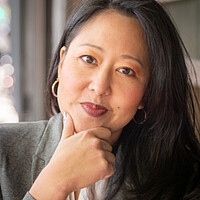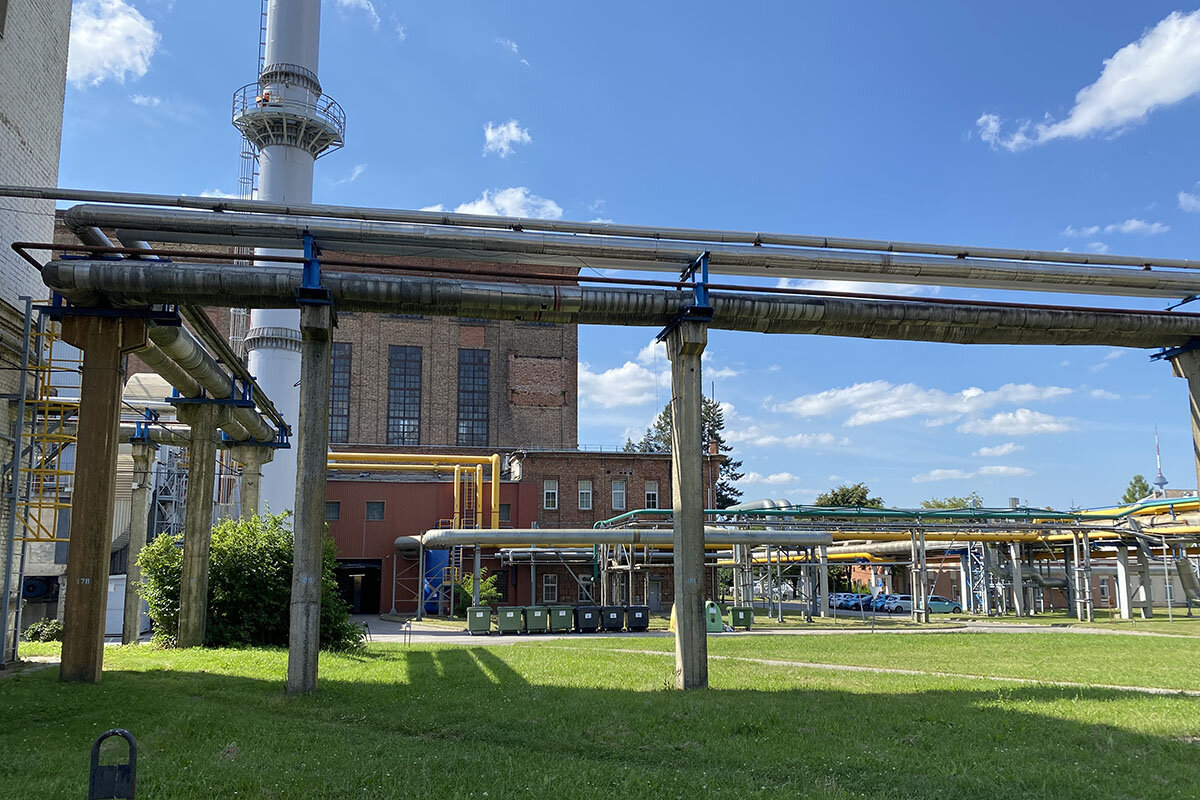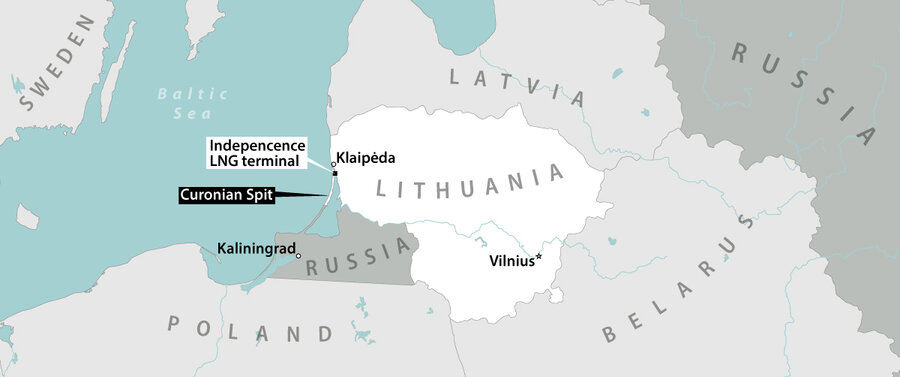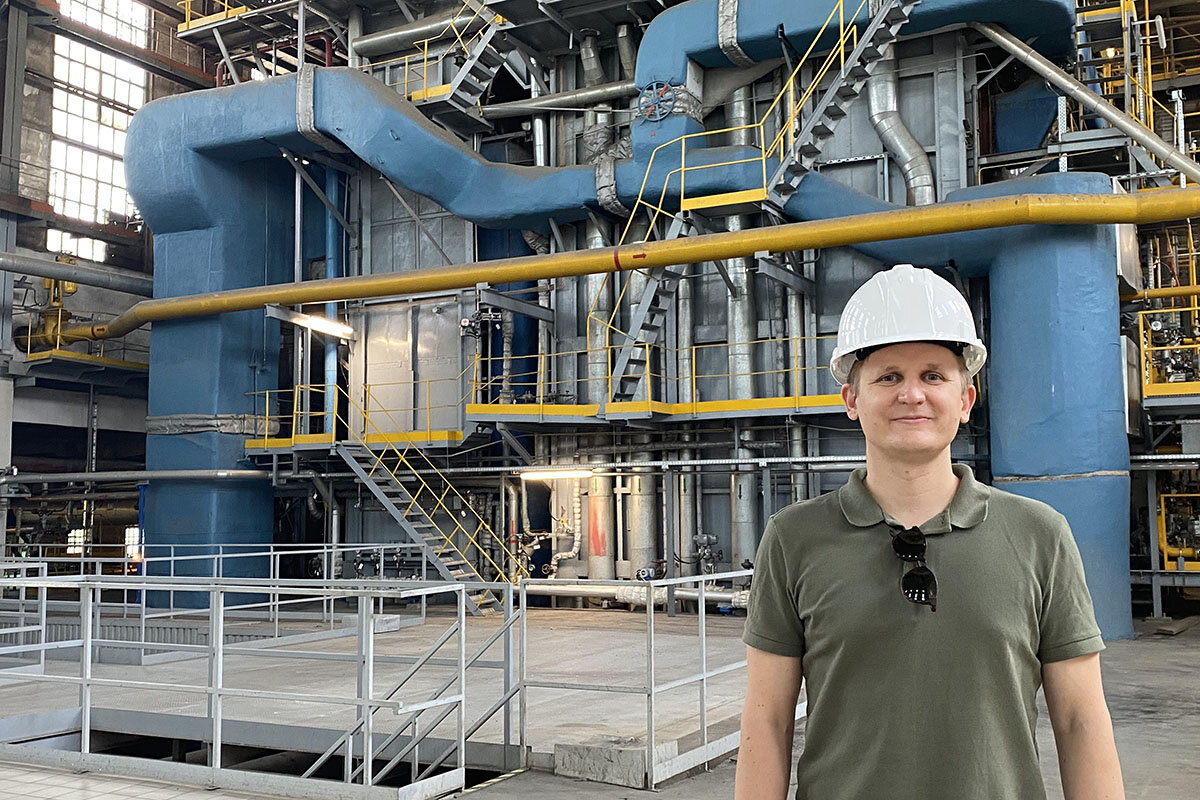Eyeing Russia, Lithuania prepped for energy ‘Independence’ years ago
Loading...
| Vilnius, Lithuania
As Europe scrambles to defend itself against Russian aggressions, tiny Lithuania is reaping the benefit of cleareyed moves made more than a decade ago. That was when it commissioned the Independence, a massive floating vessel and processing terminal for liquefied natural gas.
Linas Kilda was the Lithuanian project manager tasked with overseeing ground-to-sea pipeline connections for the Independence. It was the early 2010s, and public sentiment was sharply divided. Yet success would mean Lithuania could eventually pick and choose among energy suppliers. At that time, Russia supplied the vast majority of Lithuania’s energy needs while playing politics with prices.
“We were paying the highest prices in the EU,” says Mr. Kilda, recalling the years just before the terminal opened in 2014. “My grandparents survived the deportation to Siberia during Soviet times, and they always dreamed of an independent Lithuania.”
Why We Wrote This
A story focused onBefore Russia waged war in Ukraine and threatened Western energy supplies, Lithuania steeled itself against such aggression – shown by its acquisition nearly a decade ago of a ship called Independence.
Indeed, long before the West woke up to Russian President Vladimir Putin as a threat, 3 million-strong Lithuania had always had eyes on its gargantuan neighbor. Following Russia’s annexation of Crimea in 2014, Lithuanian leaders boldly declared that Mr. Putin had already started waging war on Europe, a claim that pacifist ears in Germany and the West didn’t hear.
Today, a series of policy decisions made over decades, based on the principles of preserving and promoting democratic freedoms – including commissioning the Independence, but also the recognition of Belarusian pro-democracy opposition and Taiwan’s representative office – looks prescient. While Western Europe might have previously reacted to those decisions with laughter, skepticism, or frustration, Lithuania is now able to start driving select parts of the EU agenda with its approach.
“We always are fighting for spread of democracy and human rights because of our neighbor,” says Andrius Kubilius, who served as prime minister when the Independence was ordered in 2011.
“Thirty kilometers [18 miles] from Vilnius is a border where the democratic continent ends and you have Russia and Belarus – totalitarians. We understand it in a very simple way: If autocracies are not stopped in the very beginning, then they become international aggressors, like what happened with Putin.”
“Counting butterflies during a war”
Every week for more than two years in the early 2010s, Mr. Kilda oversaw pipeline construction for the Independence on the Baltic coast as a then-project manager for Lithuanian LNG operator Klaipedos Nafta. It required sacrifice, spending long days apart from his family in Vilnius, the capital, but he’d signed on not only for professional but also for personal reasons.
“One of the key drivers for me joining this project was to help my country become independent,” says Mr. Kilda. The Soviet Union had occupied Lithuania for 50 years beginning in the 1940s, and the forced deportations and resettlements of tens of thousands of Lithuanians made an indelible mark on many a family history, including Mr. Kilda’s.
Should Lithuania have its own LNG terminal – which re-gasifies a supercooled form of natural gas – vessels from any country could slide into Lithuania’s port. This would break Russia’s stranglehold on supply.
Russia enjoyed a near monopoly on oil and gas supplies to Lithuania, and it had been weaponizing energy in negotiations with the country, which had only declared independence from Moscow in 1991. “Russia started using energy as a weapon against Western Europe only one year ago, but Eastern Europe was under fire all the time,” recalls Albinas Zananavicius, the country’s vice minister of energy. Meanwhile, Russian state media was dubbing Lithuania a “dying young democracy” doomed to “energy destitution.”
Against this backdrop, the government instituted a tight deadline for the Independence to come online. Major milestones aside, countless minor details needed attending to.
The Curonian Spit, a UNESCO World Heritage Site whose sand dunes curve along the Baltic Sea from the Russian enclave of Kaliningrad in the south to Lithuania in the north, needed special attention. One part of the spit harbored spawning fish. A nesting habitat for sea gulls needed encircling with a tent, recalls Mr. Kilda. Local citizens needed to be reassured that having massive amounts of LNG in their backyard wouldn’t pose a danger.
“We were counting butterflies during a war,” says Mr. Kilda, recounting a running joke of the day. Even the colors of the ship came under fire. “Some guys asked why the Independence is in Russian colors,” he says. “But white, blue, and red has the lowest visual impact. So it’s not so visually disturbing.”
Finally, in 2014, the tankerlike Independence pulled into the port of Klaipėda with Lithuanian flags waving and a national audience on television. The impact on gas prices was immediate: They plummeted. The week prior, Lithuania was paying on average €8 ($8.20) more per kilowatt-hour than Western Europe; since then, the country has enjoyed an estimated savings of €150 million every year as the Independence forced Russia to compete with other natural gas suppliers, estimates Mr. Kilda’s team.
Today, ships carrying LNG from Norway, the United States, and a multitude of other sources pull up alongside the Independence to transfer their precious cargo. Lithuania was the first EU country to stop buying Russian gas after the war began. And now energy companies from other countries have come calling. “The Independence has been asked after as a model of independence for not only Europe but Asian countries, and even some smaller countries which are also struggling with having a single supplier,” says Mr. Kilda.
“We were always the freedom fighters”
Lithuania’s embrace of independence from the dictates of larger authoritarian countries doesn’t end at its own borders. Last fall, the government allowed Taiwan to open up a representative office in Vilnius and dubbed it of “Taiwan” rather than of “Chinese Taipei,” as many countries do in the ongoing quest not to irk China.
“It’s our right to call the office whatever we want,” says Mr. Kubilius, the former prime minister. “China needs to understand that the world during the last several hundred years was led by democracies.”
China promptly downgraded diplomatic relations and also halted certain Lithuanian imports such as beef and dairy. But the European Union – which first met Lithuania’s move on Taiwan with skepticism and frustration – ultimately rallied behind Lithuania and filed a complaint with the World Trade Organization.
“Bravery comes with particular costs,” says Margarita Šešelgytė, director of the Institute of International Relations and Political Science at Vilnius University. “China plays under the carpet and informally we receive praise for what we’re doing, but formally no one is following.”
That said, Taiwan is also now committing to new investments in Lithuania.
Lithuania has also offered refuge to the pro-democratic opposition of Belarusian leader Aleksander Lukashenko, and vocally supported Hong Kong’s pro-democracy movement, even while other countries demurred from provoking Russia and China.
Perhaps it’s Lithuania’s “fighting spirit,” says Mr. Zananavicius, the Lithuanian vice minister of energy, who recalls that when the Independence was first being discussed, people were “laughing at us.”
“But if we’d listened, our independence wouldn’t have materialized. Our struggle was difficult, but we were always the freedom fighters. It’s a little bit in the blood.”
“The freedom to do whatever we wanted”
The fight for freedom seems to be something Lithuanians take pride in, and declare it’s worth paying for. Even though subzero temperatures are a fact of Lithuanian winters, having the right sources of energy is as important as the cost of the winter heating season.
“I was brought up kind of hating Russia,” says Arunas Smalskys, an information technology engineer who lives in Vilnius. “So independence from Russian oil, Russian gas was always a decision my parents wanted our government to make. The freedom to do whatever we wanted.”
Eugenja, a housecleaner who lives in Vilnius and asked that her last name not be used, remarks that her heating costs for the upcoming season will be nearly double last year’s due to Europe’s energy crisis, but it will be “worth it.” “It’s better to have our own supply, rather than give our money to other countries.”
And the Independence now sets up Lithuania to export energy, especially as Russia threatens the supplies of EU neighbors that still rely heavily on its energy.
In Vilnius, exhaust chimneys stand idle at a massive power plant run by state-owned energy company Vilnius Šilumos Tinklai, which supplies most of Lithuania’s heat. The company burns biomass and also distributes LNG. Come winter, the chimneys will be working overtime, especially as Mr. Putin has pinched off gas to Poland, Bulgaria, Finland, the Netherlands, and Denmark. Prices are skyrocketing and countries are scrambling to stockpile.
“We’ve already secured the necessary gas for winter, but we have to feel the responsibility not only for ourselves,” says Paulius Martinkus, Vilnius Šilumos Tinklai’s chief strategy officer. He and his employees are preparing for the possibility that they might need to burn fuel oil to create enough energy supply to help needy neighbors. “We can burn gas and let the neighbors freeze, but it’s not the right approach. We have a values-based approach.”
At the plant’s main switchboard, Kazimieras Paulavicius recalls Lithuania’s long fight for independence from Russia. “Tanks were rolling down the streets at night, and I felt despair and concern,” he says. Today he works with lights off when possible, having long understood the link between energy and values.
“Energy independence is our weapon,” says Mr. Paulavicius, who has worked in the industry for nearly 50 years. “It means we can buy and sell energy, choose different fuels, have flexibility.”
That flexibility, says Mr. Martinkus, will now benefit others. “We are mobilizing and basically living to values, and we are getting employees on board as well. We want to be part of Europe, and we feel the responsibility of being part of Europe. It’s not only about taking, it’s also about giving.”
Ieva Balsiunaite supported reporting for this story.









